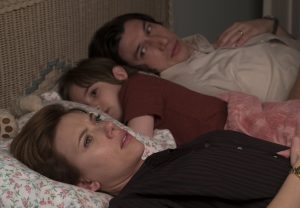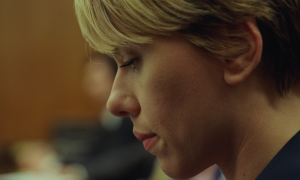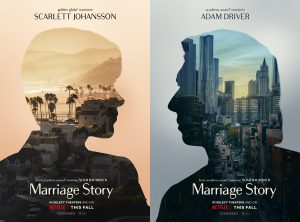‘Marriage Story’ showcases what makes a relationship succeed – or fail
“Marriage Story” (2019). Cast: Scarlett Johansson, Adam Driver, Laura Dern, Alan Alda, Ray Liotta, Julie Hagerty, Merritt Wever, Wallace Shawn, Azhy Robertson, Martha Kelly, Mark O’Brien, Robert Smigel, Brook Bloom. Director: Noah Baumbach. Screenplay: Noah Baumbach. Web site. Trailer.
It’s sad when a relationship comes to an end, even when it’s the best thing for the partners involved. But matters can become that much worse when the parting becomes inflamed with heated rhetoric and venomous emotions, not only for those directly involved, but also for those touched by the fallout. Such is painful saga outlined in the gripping new family drama, “Marriage Story.”
From all outward appearances, Charlie and Nicole Barber (Adam Driver, Scarlett Johansson) have what seems to be a happy and fulfilling marriage. But, as quickly becomes apparent, looks can be deceiving. After years of simmering tensions between the two of them, the New York theater company director and his actress wife have agreed to divorce, a process they hope to implement with civility, cooperation and the best of intentions. They hope to make the transition as smoothly and seamlessly as possible for all concerned, especially their young son, Henry (Azhy Robertson).
However, those hopes are quickly dashed. Despite their agreement to work with a mediator (Robert Smigel) to cushion the separation process, those plans go out the window when Nicole reneges and refuses to cooperate. And, not long thereafter, matters are further derailed when Nicole accepts an offer for a television pilot, an opportunity that takes her to Los Angeles – with Henry in tow. Suddenly the Barbers have become bicoastal parents, with Henry caught between his increasingly contentious mom and dad.

Divorcing parents Nicole Barber (Scarlett Johansson, left) and husband Charlie (Adam Driver, right) wrestle with custody issues involving their young son, Henry (Azhy Robertson, center), in director Noah Baumbach’s “Marriage Story.” Photo by Wilson Webb, courtesy of Netflix.
It isn’t until Nicole arrives in California that viewers begin to learn what’s really been going on between her and Charlie. During impassioned venting sessions with her mother, Sandra (Julie Hagerty), her sister, Cassie (Merritt Wever), and especially her newly hired divorce lawyer, Nora Fanshaw (Laura Dern), Nicole offloads what’s been bugging her. And she has a lot to say.
According to Nicole, Charlie perpetually put his vocational needs first, making her aspirations secondary, despite his willingness to feature her prominently in his theatrical productions. This, combined with the obligations of motherhood, left her feeling unfulfilled, dismissed and ignored (in a word, “smaller”). What’s more, as an Angelino by birth, she longed to explore career options in her hometown and not just those on the New York stage, something she claimed Charlie always downplayed or placed on the back burner. Oh, and, if that weren’t enough, she suspects he slept with his theater company’s stage manager.
Upon hearing all this, Nora convinces Nicole that she’s got quite a case, one ripe for a generous settlement. However, this news only serves to inflame an already-tense situation. When Charlie learns that Nicole has hired an attorney, he’s upset, given that they had originally agreed to work out their separation without lawyers becoming involved. What’s more, once Nicole’s TV pilot is picked up as a series, she decides to relocate to California permanently, a living arrangement that includes Henry. What started out as a hoped-for amicable parting has now begun to get ugly.

Nicole Barber (Scarlett Johansson) seeks a divorce from her husband Charlie, claiming that he’s placed her needs secondary to his, as seen in the gripping new drama, “Marriage Story.” Photo by Wilson Webb, courtesy of Netflix.
To protect his rights, Charlie amps up his game by looking to hire an attorney of his own, Jay Marotta (Ray Liotta), a hard-nosed, pricey counselor who is everything that he had hoped he could avoid. He soon discovers, though, that Jay is someone whom he neither can nor wants to afford, both financially and ethically. Yet, if he’s to preserve his child custody rights, he needs to find replacement counsel quickly, a requirement that urgently leads him to Bert Spitz (Alan Alda), a less expensive, more conciliatory family law attorney.
On Bert’s advice, to help secure his rights in the eyes of the court, Charlie rents an apartment in Los Angeles to demonstrate his desire to be close to his son. He begins dividing his time between the coasts, working on the launch of a new Broadway production while doing what he can to try and keep things civil in his divorce proceedings. Circumstances deteriorate further, though, when the legal bickering intensifies, with accusations and maneuverings that become downright vicious, sometimes to an utterly preposterous level. Even Jay returns to the fray when Charlie admits he needed to hire “an asshole of his own” to fight on his behalf. By this point, it’s hard to imagine that these two people ever loved one another – or that they’ll ever be able to reach a workable agreement, especially where Henry is concerned.
Many of us would naïvely like to believe that love is all it takes to make a relationship succeed. If only that were true. However, as anyone who has ever been involved with someone for the long term knows, it calls for more than just a romantic connection. It also takes a commitment to hammer out all of the details that go into building a partnership on multiple levels, all of which require a high degree of mutual agreement for them to work. And that may prove to be more challenging than being able to love someone else, no matter how much.

Charlie Barber (Adam Driver) struggles to hold on to his child custody rights in contentious divorce proceedings with his wife, Nicole, in director Noah Baumbach’s “Marriage Story,” now available for streaming on Netflix. Photo by Wilson Webb, courtesy of Netflix.
How all of those other elements come together depends on the beliefs held by each party, and that’s important to recognize, for those intentions lead to what a couple manifests. Such is the outcome of the conscious creation process, the philosophy that maintains we draw upon those metaphysical building blocks in materializing what we experience.
Given the challenges we can each experience in successfully formulating, defining and implementing our manifesting beliefs, it can be that much more difficult when having to get two individuals on the same page when it comes to this process. And, when seeking to build a life together, think about the myriad areas in which a couple needs to pursue belief agreement – living arrangements, finances, career aspirations, having children and hopes for the future, to name but just a few. Now, considering that many of us have trouble enough achieving satisfaction in any of those areas by ourselves, it’s truly quite an undertaking when partners seek to tackle them together. The fact that a couple is able to attain concurrence on any one of these various fronts – let alone all of them – is indeed amazing. Which is why it’s not entirely surprising that disagreements are going to occur along the way. And, if there are enough of them, it’s not too difficult to imagine discord springing up in the relationship. Should they reach a serious enough degree, the relationship can easily be thrown into jeopardy – which can lead a couple to where Charlie and Nicole are at.
This is not to suggest that such situations are irreparable. If both partners are aware of a problem, they can discuss the matter, preferably by deeply examining the beliefs that are the root cause of the disagreement. Through effective listening and a willingness to cooperate in finding a workable solution, it’s entirely possible for a couple to rewrite their beliefs to more amenable notions that address the issues at hand and give them both what they want. Everybody wins.

Divorce lawyer Nora Fanshaw (Laura Dern, left) advises her client, Nicole Barber (Scarlett Johansson, right), about her rights in parting from husband Charlie in director Noah Baumbach’s latest offering, “Marriage Story.” Photo by Wilson Webb, courtesy of Netflix.
However, when those considerations aren’t brought into play, it’s not unusual for circumstances to spin out of control. Those conditions, in turn, can lead to the formation of negative beliefs that each partner may begin to hold about the other – beliefs that don’t do much to nurture and support the viability of the relationship, such as resentment and spite. Once qualities like that enter into the mix, it becomes increasingly difficult to go back, even to recognize the love that birthed the partnership in the first place. With the well poisoned, it’s often downhill from there, especially if advocates for each partner become involved and turn up the volume of the arguments between them. And, again, you have Charlie and Nicole.
One of the points “Marriage Story” drives home quite effectively is how totally absurd some of these vindictiveness-driven beliefs can become. Divorcing partners and their attorneys can distort their impressions of one other all out of proportion, resulting in ludicrous, completely inaccurate, even laughable depictions of one another. This can be especially true when implemented to drive up the stakes of a settlement, a distinct act of un-conscious creation, where beliefs are put into place simply to achieve a particular outcome with no consideration for the consequences. The result can be far more devastating for all involved (and that can include more than just the divorcing partners, such as situations where children are involved).
The key to avoiding such outcomes – and perhaps to avoiding divorce in the first place – is to aspire to successful acts of co-creation. Through this practice, both partners seek to formulate, define and implement beliefs aimed at achieving mutually agreeable results, no matter what aspect of the relationship is being addressed. If employed as an overarching principle in the way the marriage works, there is a far greater likelihood of achieving harmony and long-term success. And, even if the relationship ultimately does not succeed, divorcing partners could at least attempt to employ co-creation as a means of coming up with a workable settlement, one that leads to separation on amicable terms, particularly where custody questions come into play. One can only hope that Charlie and Nicole will find it within themselves to come up with such a solution for themselves – if not for their own sake, then at least for Henry’s.

Divorcing parents Nicole Barber (Scarlett Johansson, left) and husband Charlie (Adam Driver, right) embark on a bitter course of proceedings in director Noah Baumbach’s “Marriage Story.” Photo by Wilson Webb, courtesy of Netflix.
While some critics and viewers have correctly said that this film covers ground that’s been addressed before and that it occasionally tends to play like both a therapy session and a legal consultation, writer-director Noah Baumbach’s latest nevertheless offers an engaging mix of heartache and humor, showing the pain and utter absurdity that goes into the dissolution of a marriage. The truly superb ensemble cast, with excellent performances by Johansson, Driver, Liotta, Hagerty, Alda and, especially, Dern, coupled with a razor-sharp script, make for a dynamite combination that reaches out, grabs and holds audience attention from beginning to end. Arguably Baumbach’s best film, this offering is more than deserving of all the praise that it has rightfully had heaped upon it. You’ll laugh, you might cry and you’ll definitely feel the heart strings tugged with this one, but the picture assuredly earns the reactions it evokes. The film is still in limited theatrical release and is also available for streaming on Netflix.
“Marriage Story” has already picked up quite a haul of awards season nominations, with more likely to follow. The picture leads the pack of this year’s Golden Globe Award offerings, earning nods for best dramatic picture, best screenplay and best score, as well as acting nominations for Driver, Johansson and Dern. It also scored big in the Critics Choice Award competition, with nominations for best picture, best director, best screenplay and best score, along with acting nominations for Driver, Johansson, Dern and the ensemble cast. Driver, Johansson and Dern picked up additional nominations for their performances in the Screen Actors Guild Awards contest, portrayals that helped earn the picture a National Board of Review Award as one of 2019’s Top 10 Films. And, in the Independent Spirit Awards competition, “Marriage Story” has already been named the winner of the Robert Altman Award for best ensemble cast, as well as a best screenplay nominee.

In an age when so many of us find ourselves at odds with others, it would be comforting to believe that we could at least find protection from those storms in the sanctuary of our relationships. Unfortunately, even those involvements aren’t always immune from the impact of such contentiousness, presenting us with another source of conflict, one that can be particularly disconcerting given the highly personal arena in which the disagreement unfolds. One can only hope that films like “Marriage Story” provide us with sufficient cautionary tales to avoid the pitfalls of relationships gone awry – and remind us of the tremendous joys that got us into them in the first place.
Copyright © 2019, by Brent Marchant. All rights reserved.




Leave A Comment